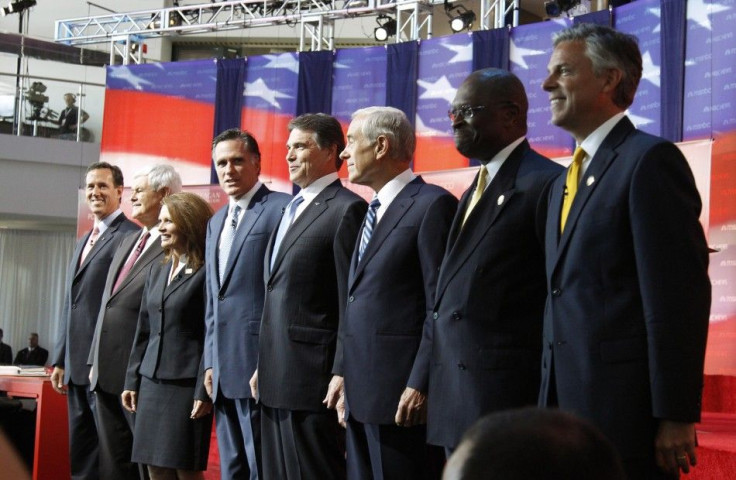GOP Candidates' Debate: The Problem with Numbers
ANALYSIS

At the start of Wednesday's GOP debate, Rick Perry and Mitt Romney battled over jobs creation. Each claimed to have the stronger record and each had the statistics to prove it.
Perry's strongest point of the night was his first. He told the audience at the Ronald Regan Presidential Library in California that under his command, Texas added one million jobs over the past 10 years, while America collectively lost 2.5 million jobs.
From then on, the debate got messy, and the subsequent first back-and-forth between Perry and Romney highlighted an underlying problem with this debate, as well as with all debates.
Numbers sound good, but they don't mean anything out of context.
Viewers learned on Wednessday that under Romney's leadership, Massachusetts ranked 47th out of 50 states in terms of jobs creation. But Romney countered, saying that after four years, unemployment in the state was at only 4.7 percent.
That's a record I think the president would like to see, he said. As a matter of fact, we created more jobs in Massachusetts than this president has created in the entire country.
So what does America believe?
That Romney was good at creating jobs or that he was bad? If we listen to Perry -- who attacked by saying that Romney had one of the lowest jobs-creation rates in the country and that Michael Dukakis created jobs three times faster than you did, Mitt -- Romney was a failure, only suited to slashing private sector workers. If we listen to Romney, it's a different story.
When Utah's Jon Huntsman got into the mix, he said that under his leadership, the state was the No. 1 jobs creator in this country.
To my good friend, Mitt, 47 just ain't going to cut it, my friend, not when you can be first, jibed Huntsman. We've got to remember, that to beat President Obama, we have to have somebody who's been in the private sector, understands the fragility of the free market system, has been a successful governor as it relates to job-creation, and knows something about this world.
The problem with these numbers is that they've no context. Texas during the 2000-to-2010 period isn't the same as Massachusetts between 2003 and 2007. The economic climate of this country changed drastically for the worse in 2008 and there was also a recession in 2001, two years before Romney took office.
Looking at jobs in two very different states during changing economic climates is tricky at best.
Simply saying who created the most jobs is reckless. Massachusetts has a population of 6.5 million people, while Texas has more than 25 million. Perry's insinuation that adding a million jobs is more impressive than Romney's figures doesn't tell the full story.
According to The Miami Herald's fact-checking of the debate, during Perry's turn at the Texas helm, he averaged less than two percent job growth over 11 years.
In pure numbers, Perry's 90,000 new jobs per year as governor was higher than Romney's 15,000, but unemployment rates, income levels and general welfare aren't considered.
Romney boasted lowering unemployment to under five percent. Currently, Texas suffers from 8.4 percent unemployment, despite Perry's massive jobs creation.
When Perry took office, unemployment was at 6 percent. By April 2007, that had slowly lowered to 4.2 percent, but in 2008 it began a rise to its current level.
Yet, even those figures don't show the whole picture, and the unemployment rates for the whole U.S. follow a near identical trajectory.
But if not numbers, what do we have? Well, having a plan is one thing. When the debate moved from jobs to topics like Social Security, health care to border-fences, candidates did a good job moving from numbers to actions. When deciding on a Republican presidential candidate, it should be plans for the future that matter more than fuzzy records of the past.
© Copyright IBTimes 2024. All rights reserved.











